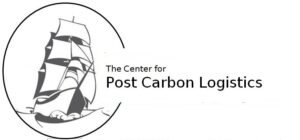
Despite its present dominance, our current logistics system engaged in moving people and goods from place to place is fragile. It is reliant upon carbon-based fuels driving internal combustion engines. It is interwoven into long-distance, globalized world trade. It is designed for Just-In-Time delivery. And it depends upon its present ability to avoid paying for negative externalities such as carbon emissions and environmental pollution, and to avoid being governed by meaningful labor, environmental, health, and other laws. The World Economic Forum determined in 2018 that if shipping were a country, it would be the world’s sixth-biggest greenhouse gas emitter.

There are serious doubts as to the capacity of the current system to adapt to structural changes in the status quo. The political context is changing and, in some regions, unstable. Carbon pricing regimes are likely to arrive in the coming years, which will raise prices for carbon-based fuels and for producing goods.
Warming is undermining agriculture and fishing in many regions, and other economic sectors may be affected. Climate-triggered conflict is already causing mass migration, which is in turn improving the political fortunes of nativist political groups, which is already straining the current world trade model. These trends and unpredictable new shocks are certain to strain the system in the coming years and decades. As an increasing number of sectors act on the need to reduce carbon emissions and an increasing number of policies and strains make carbon prices higher and more volatile, the question is whether local, national, and global economies are prepared.
Better than asking whether we will be prepared is knowing that changes both predicted and unpredicted are happening and more are on the way—and then asking how we should prepare. How can a new approach to transportation logistics be developed that is resilient to the climate emergency and the resulting changes in the economic landscape, one that stands some chance of preserving some of our current standard of living for future generations, one that is also equitable, inclusive, and just in delivering the benefits of the new system and whatever version of shipping and trade is to come for future decades and generations?
To answer these questions, we have created the Center for Post Carbon Logistics (CPCL), Our approach is to identify new—and old—technologies, skills, economic models, and regulatory and logistics practices that will serve the future.

Our approach will be both global and local. Globally, CPCL will search for examples of effective techniques, both current and historic, that have moved goods and people from place to place. We will consider examples ranging from Renault and Neoline’s partnership to build a wind-powered ro-ro vessel and cutting edge solar and wind-assist sailing technologies, to existing and in-development trade routes promoted by the International Windship Association and others, to traditional small-scale sail, low-or zero-carbon shipping like Fair Transport, and first and last-mile logistics that have been used for generations and will once again be viable. Hudson Valley contemporary examples are the sail freight vessel Apollonia, and the Hudson River Maritime Museum’s solar electric Coast Guard inspected passenger vessel Solaris.

Locally, CPCL will model, implement, and evaluate the development of these global practices. One aspect of this will be to build partnerships with local governments, businesses, economic and community development organizations, and nonprofits to develop new, resilient “working waterfronts” that will facilitate regional waterborne shipping, connecting goods to low-carbon first and last-mile delivery modes and creating economic opportunity and jobs. CPCL’s local pilot projects in the Hudson Valley will bring direct local benefits while providing insights to be disseminated widely for locally-tailored replication elsewhere.
CPCL will also build a central library and database collecting low- and zero-carbon techniques, skills, and tools for shipbuilding, rigging, ship loading, port operations, warehousing, trading houses, and first and last-mile logistics.

Researchers will collect these practices. Existing skills and tools that are at risk of being lost will be preserved. To build a community of practice, CPCL will provide training and apprenticeship programs with participating partners, developing the necessary local workforce and catalyzing job creation. CPCL will also disseminate the knowledge that it creates and preserves, exhibit at and host regional, national, and international conferences on post carbon logistics and sail freight. It will partner with Hudson Valley institutions to host exhibits for the public.

The climate crisis is already here, and even though the exact timing is not yet obvious, it is clear that the contemporary logistics system will have to adapt. In the Hudson Valley, local farmers and food processors, distillers, brewers, and cider makers, are already looking for low carbon ways to move their goods beyond the local market; there are practitioners who are ready and willing to pass on their knowledge; local governments are desperate to find new economic development strategies; and consumers are hungry for lower carbon-footprint goods. These are the challenges and opportunities in which the Center for Post Carbon Logistics will engage.

Leave a Reply to Raj Sharma Cancel reply